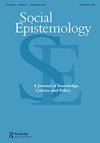Censorship Bubbles Vs Hate Bubbles
IF 2
2区 哲学
Q1 HISTORY & PHILOSOPHY OF SCIENCE
引用次数: 0
Abstract
ABSTRACTIn this paper, I argue that considerations of epistemic bubbles can give us reason to defend censorship of hate speech. Although censoring hate speech leads to epistemic bubbles (‘censorship bubbles’), they tend to be less epistemically problematic than epistemic bubbles generated by the circulation of hate speech (‘hate bubbles’). Because hate speech silences its target groups and creates the illusion that the dominant group identities are threatened, hate bubbles are likely more restrictive in structure than censorship bubbles and have a stronger tendency to turn into echo chambers where opposing views are actively discredited. Therefore, I argue that censorship bubbles might be a minor price we ought to pay to avoid hate bubbles. Additionally, my analysis shows that we cannot focus exclusively on the content or the structure of epistemic bubbles, since their content can partly determine their structure, as is in the case of hate bubbles.KEYWORDS: Hate speechcensorshipepistemic bubbles AcknowledgmentsI thank Emanuel Viebahn, Caroline West and James Evans for reading and commenting on this paper.Disclosure statementNo potential conflict of interest was reported by the author(s).Notes1. Here Alcoff draws from Lorraine Code Citation1993.2. Here Alcoff draws from Sandra Harding Citation1991.3. Here Alcoff draws from Charles Mills Citation1997.Additional informationNotes on contributorsWendy XinWendy Xin is a PhD candidate in Philosophy at the University of Sydney. Her research interests include environmental ethics, emotions, feminist philosophy and social epistemology.审查泡沫Vs仇恨泡沫
在本文中,我认为对认知泡沫的考虑可以给我们辩护仇恨言论审查的理由。虽然审查仇恨言论会导致认知泡沫(“审查泡沫”),但它们往往比仇恨言论流通产生的认知泡沫(“仇恨泡沫”)在认知上的问题更少。因为仇恨言论让目标群体噤声,并制造了一种主导群体身份受到威胁的错觉,所以仇恨泡沫在结构上可能比审查泡沫更具限制性,而且更容易变成回音室,在那里,反对意见被积极地抹黑。因此,我认为审查泡沫可能是我们应该付出的一个小代价,以避免仇恨泡沫。此外,我的分析表明,我们不能只关注认知泡沫的内容或结构,因为它们的内容可以部分地决定它们的结构,就像仇恨泡沫的情况一样。感谢Emanuel Viebahn, Caroline West和James Evans对本文的阅读和评论。披露声明作者未报告潜在的利益冲突。这里Alcoff引用了Lorraine Code Citation1993.2。这里Alcoff引用了Sandra Harding的引文。这里Alcoff摘自1997年的Charles Mills引文。本文作者wendy Xin是悉尼大学哲学博士研究生。她的研究兴趣包括环境伦理、情感、女性主义哲学和社会认识论。
本文章由计算机程序翻译,如有差异,请以英文原文为准。
求助全文
约1分钟内获得全文
求助全文
来源期刊

Social Epistemology
Multiple-
CiteScore
2.60
自引率
17.60%
发文量
60
期刊介绍:
Social Epistemology provides a forum for philosophical and social scientific enquiry that incorporates the work of scholars from a variety of disciplines who share a concern with the production, assessment and validation of knowledge. The journal covers both empirical research into the origination and transmission of knowledge and normative considerations which arise as such research is implemented, serving as a guide for directing contemporary knowledge enterprises. Social Epistemology publishes "exchanges" which are the collective product of several contributors and take the form of critical syntheses, open peer commentaries interviews, applications, provocations, reviews and responses
 求助内容:
求助内容: 应助结果提醒方式:
应助结果提醒方式:


